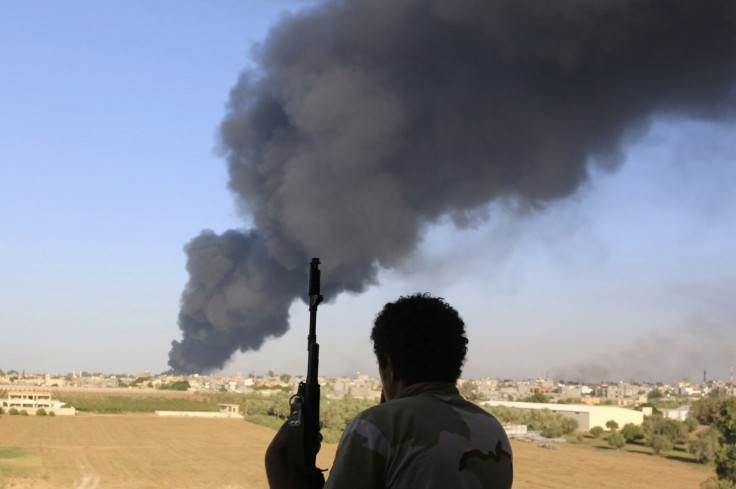Libya Oil Crisis: Three Years After Gaddafi's Death Country on Brink of Civil War

Former Libya's leader Colonel Muhammar Gaddafi was toppled and killed in 2011, during the Arab Spring Revolution, a wave of uprisings that culminated in the overthrow of dictators in some Middle Eastern countries.
Who was Gaddafi?
Colonel Muammar Gaddhafi held on to power for over 30 years. A 2014 BBC documentary depicted the former leader as a man who thought nothing of killing hundreds of people to prove a point.
Libyan agents following orders from Gaddafi were found guilty in absentia for the 1988 bombing of Pan Am 103 over Lockerbie, where 270 people died.
Four years later, according to Gaddafi's former ambassador to the US Ali Aujali, the dictator ordered the shooting down of Libyan Arab Airlines 727 plane in 1992 in an effort to make it look like a US revenge attack for Lockerbie. It took the lives of 157 people.
Allegations that Gaddafi kidnapped scores of women and subjected them to systematic abuse emerged in 2013.
French journalist Annick Cojean published Gaddafi's Harem: The Story of a Young Woman, and the Abuses of Power in Libya, recounting the story of a schoolgirl kidnapped and raped by Gaddafi.
Since Gaddafi's death, the north-African nation has struggled to contain an insurgence that is pushing the country towards the brink of civil war.
What Do the Rebels Demand?
In July 2013, Libyan rebels, led by former militia leader Ibrahim Jathran, threatened to start selling oil independently, unless they were given a greater share of oil revenues along with autonomy from Tripoli.
The rebels subsequently seized three oil ports.
When North Korean-flagged tanker Morning Glory tried to approach rebel-held Es Sider port in March 2014, the then prime minister Ali Zidan threatened to bomb it if it was loaded with oil by rebels.
The tanker, which docked at Al-Sidra - also held by the rebels, loaded at least 234,000 barrels of crude. It was the first vessel to have loaded oil from a rebel-held terminal since the insurgents had challenged the dominance of the central government.
Zidan was subsequently ousted as he was accused of having failed to deal decisively with the rebels.
A few months before the incident, the Libyan navy had fired on a Maltese-flagged tanker that had allegedly tried to load oil from the protesters in the port.
Libya Called for International Help to Stop Oil Crisis
The fight over oil supremacy quickly escalated into violence that claimed the lives of dozens of civilians.
Libya's government called for international help after some oil storage tanks were set on fire in July 2014.
The fire was started after one of the tanks was hit by a rocket. The state-owned National Oil Corp (NOC) warned of the possibility of an environmental disaster.
A few days later, militiamen took control of a key special forces base in Benghazi after a battle that killed at least 38 people.
Shortly after, the extremists declared Benghazi, Libya's second largest city, an "Islamic Emirate", claiming total control of the city.
Libya Country Information
Official name: State of Libya
Capital: Tripoli
Official language: Arabic
President: Mohammed Magariaf
Prime Minister: Abdullah al-Thani
Population: 6.2 million
Religions: Islam
Currency: Libyan Dinar
Reports emerged on Monday (20 October) that at least 75 people, including a woman, were killed at the weekend due to renewed attacks in Benghazi, following a government's offensive against the militias.
The European Union and the US expressed their concern for the escalating violence, calling for the creation of a "regular armed forces under the control of a central authority which is accountable to a democratic and inclusive parliament."
Thousands of Displaced Libyans Need Urgent Help
The United Nations High Commission for Refugees (UNHCR) warned that at least 100,000 civilians were displaced in October due to increasing fighting in the capital's Tripoli. It added that the Libya's crisis has prompted at least 287,000 people in 29 towns to flee their houses.
Thousands of Libyans are in urgent need of medical care, food and basic commodities.
"Most displaced people are living with local families, who in some cases have opened their homes to several families at a time to meet the growing need for shelter," UNHCR spokesman Gareth Edwards said. People unable to stay with relatives or host families sleep in schools, parks or non-residential buildings converted into emergency shelters.
"The growing number of displaced people is outstripping the capacities of local communities, from whom we are hearing increasing concern about the ability to cope."
© Copyright IBTimes 2025. All rights reserved.




















